| | Trump to talk policy and trade with Starmer, Syria comes in from the diplomatic cold, and Meta unvei͏ ͏ ͏ ͏ ͏ ͏ |
| |   Beijing Beijing |   Mexico City Mexico City |   Los Angeles Los Angeles |
 | Flagship |  |
| |
|
The World Today | 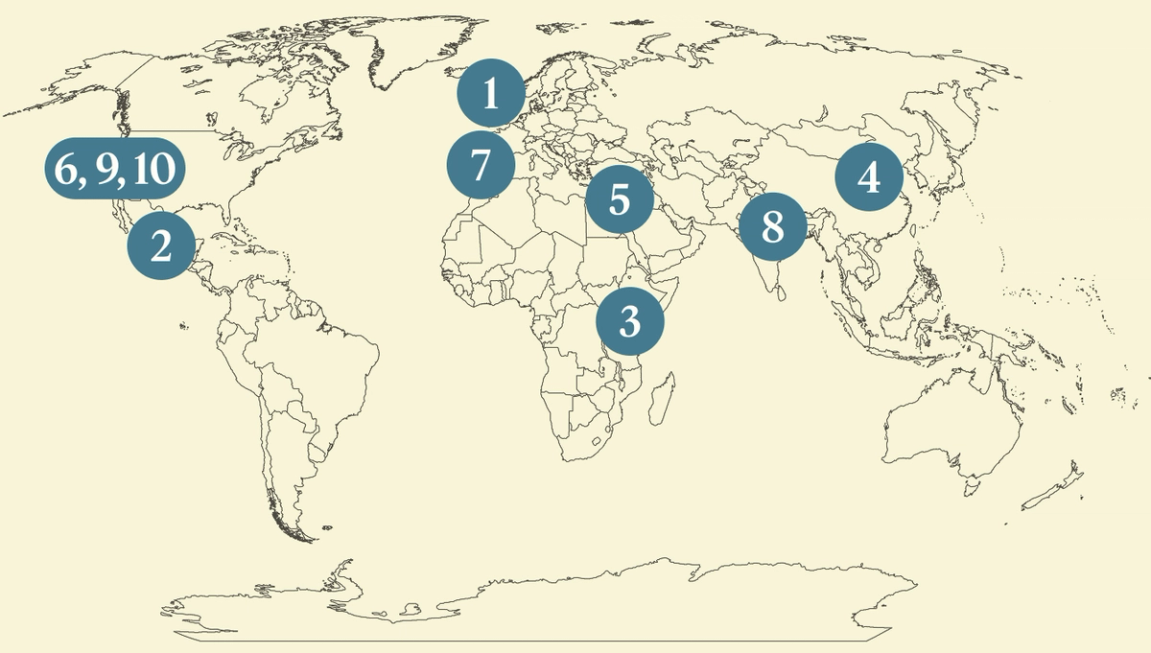 - Trump talks trade in UK
- Mexico-Canada meeting
- Risks to US-Africa pact
- China’s diplomatic push
- Syria coming in from cold
- US host punished over Kirk
- Wildfires’ economic costs
- India power emissions down
- AIs’ gold-medal coding skill
- Meta’s new smart glasses
 Poland’s shorter working week, and a classic Robert Redford movie. |
|
Trump in UK to talk policy, trade |
 Doug Mills/Pool via Reuters Doug Mills/Pool via ReutersUS President Donald Trump’s state visit to the UK, thus far marked by royal pageantry, pivots to more fraught territory today with discussions of policy, trade, and, potentially, Jeffrey Epstein. Trump lavished praise on the British royal family during a white-tie dinner last night, but today meets with UK Prime Minister Keir Starmer and, later, the UK press. The two leaders will tout good news — US firms pledged $200 billion in UK investment — but must navigate thorny disagreements: The two countries have different stances on the Gaza and Ukraine wars, renewable energy, and free speech. Starmer recently fired his US ambassador over links to the sex offender Epstein, which could lead to awkward media questions. |
|
Canada, Mexico talk tariff threat |
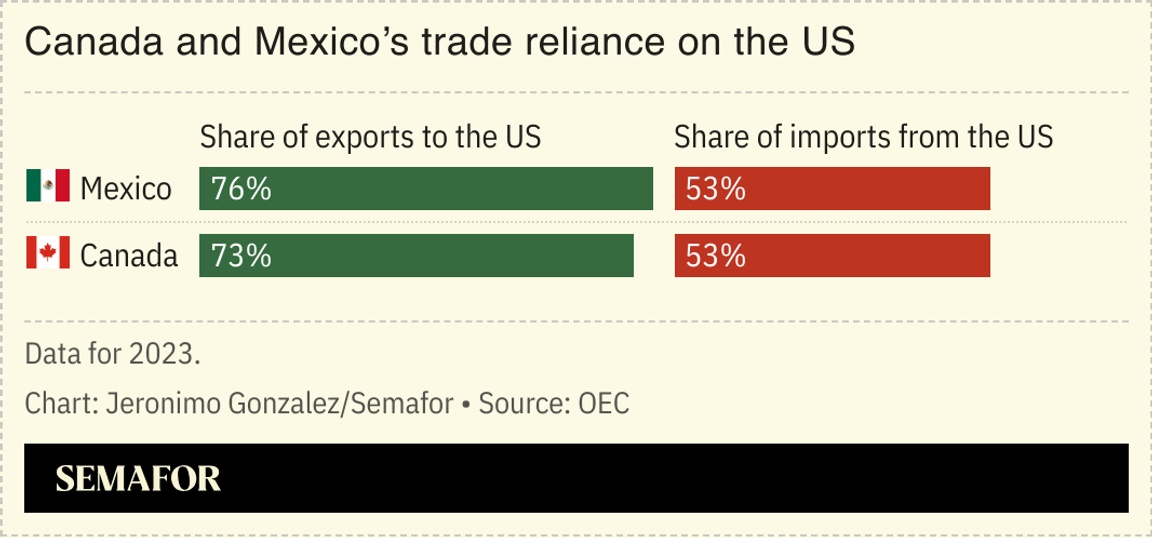 Canadian Prime Minister Mark Carney will meet with Mexican President Claudia Sheinbaum today as they look to respond to Washington’s tariff threats, which risk upending their economies. Canada and Mexico rely on the US for the majority of their imports and exports, most of which fall within a trilateral trade agreement signed during US President Donald Trump’s first term. But Trump has threatened to renegotiate the deal — up for review next year — and impose heavy tariffs if Mexico City and Ottawa fail to crack down on drug trafficking and curb Chinese investment. Both Carney and Sheinbaum know their nations’ prosperity “may depend on working together to deal with their shared neighbour,” The Economist argued. |
|
Push to save US-Africa trade pact |
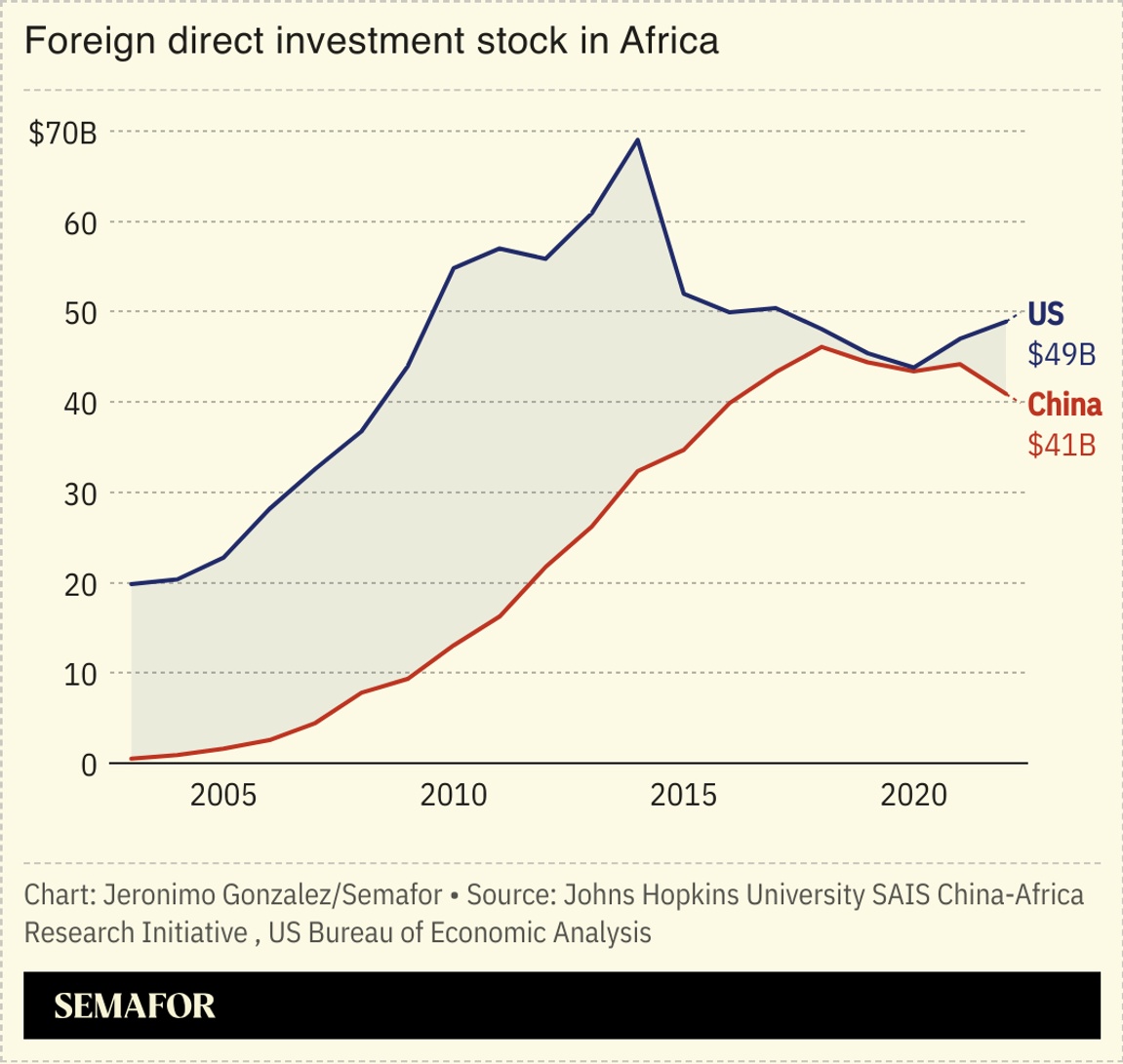 Five African nations have sent delegations to Washington in recent days in a bid to rescue a trade agreement that looks set to lapse. The African Growth and Opportunity Act, signed at the turn of the century, has helped boost trade between sub-Saharan Africa and the world’s biggest economy. But political support for renewing AGOA has collapsed, and Washington’s tariff threats pile further pressure on it. US levies have pushed African nations to seek alliances with Russia, Gulf nations, and China — which recently extended tariff-free trade to 53 African nations — at a time when many countries are vying for control of the continent’s key resources. |
|
China decries ‘law of the jungle’ |
 Florence Lo/Reuters Florence Lo/ReutersChina’s defense minister warned that the world was increasingly subject to the “law of the jungle” in opening remarks at Beijing’s top international security conference. The Xiangshan Forum comes as China makes a geostrategic push to increase its influence and present itself as a pillar of stability, implicitly critiquing US President Donald Trump’s uneven diplomatic style. Ahead of this year’s conference — attended by 1,800 representatives from 100 countries, according to state media — China hosted a major summit of world leaders and held a mammoth military parade. Beijing has also deepened defense partnerships in its neighborhood, notably making inroads in military sales to Indonesia and Malaysia, a recent Lowy Institute report found. |
|
Syria returns to diplomatic stage |
 Syrian Foreign Minister Asaad al-Shaibani. Alaa Al Sukhni/File Photo/Reuters Syrian Foreign Minister Asaad al-Shaibani. Alaa Al Sukhni/File Photo/ReutersSyria’s foreign minister will lobby US officials and lawmakers in Washington today for a permanent lifting of sanctions against his country, the latest sign the new regime in Damascus is seeking to come in from the diplomatic cold. Asaad al-Shaibani’s talks with Secretary of State Marco Rubio and several senators come after a stopover in London, where he met with Israel’s strategic affairs minister to discuss a bilateral security deal, Axios reported: Syria’s president separately told reporters those negotiations could yield results within days. The talks mark a new step in the remarkable political transformation underway in Syria, which has seen huge numbers of refugees return, too. Yet huge challenges remain, not least persistent sectarian tensions and a moribund economy. |
|
US TV host suspended over Kirk |
 Aude Guerrucci/File Photo/Reuters Aude Guerrucci/File Photo/ReutersABC suspended a late-night talk show indefinitely after the host made remarks linking the killing of conservative activist Charlie Kirk to US President Donald Trump’s MAGA movement. The top US communications regulator threatened to take action over Jimmy Kimmel’s on-air comments, in what The New York Times characterized as “an extraordinary exertion of political pressure.” It comes after Trump himself filed a $15 billion defamation lawsuit against the Times this week. Separately, CBS this year canceled its late-night show — ostensibly for financial reasons, although experts have speculated that its parent company did so in part to help win approval for a pending merger. Still, the latest move by ABC marks an “inflection point,” an executive told the media newsletter Status. |
|
How wildfires hurt the economy |
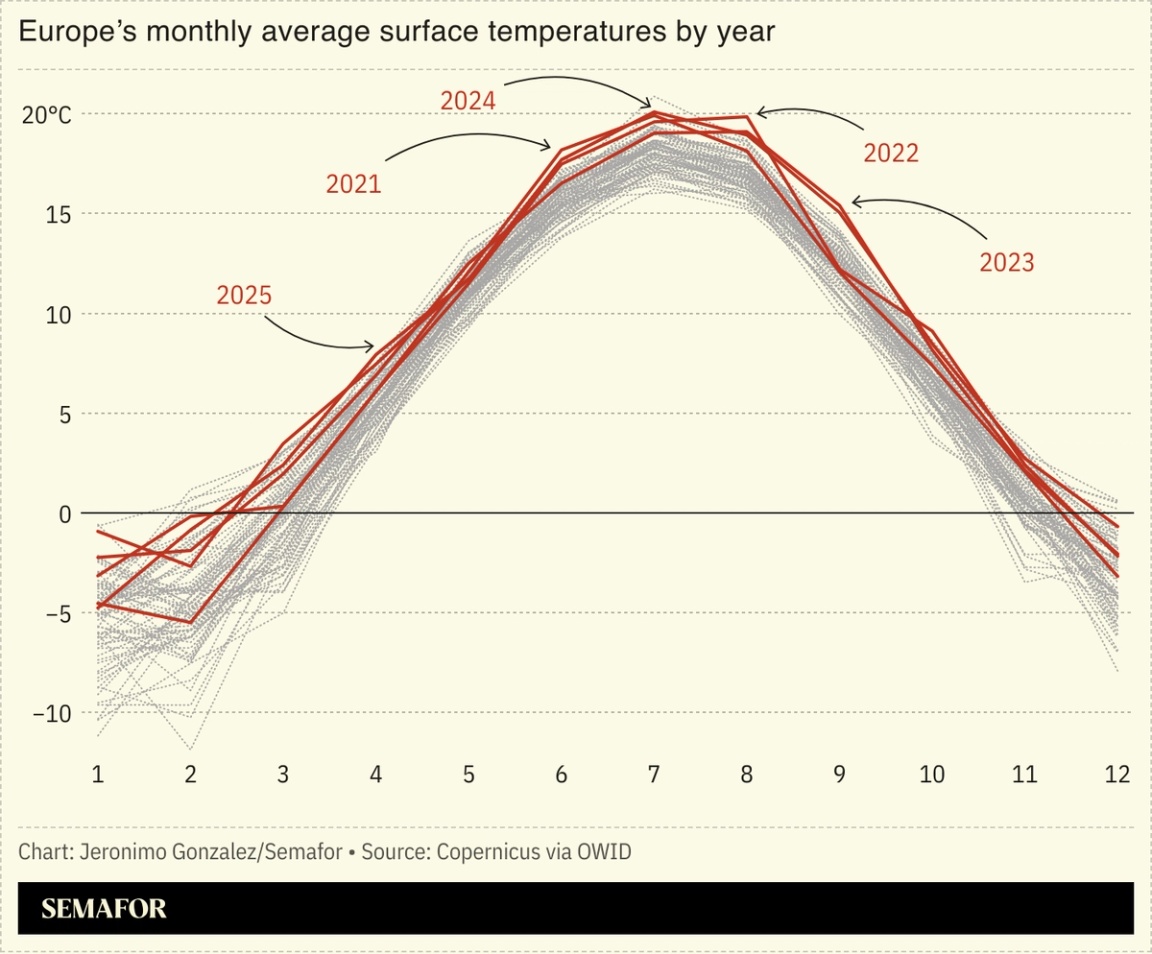 Europe and Africa are counting the costs of devastating wildfires. The Spanish national farmers’ association estimated that the industry had suffered $700 million in damages, while the country’s tourism industry, which accounts for 13% of GDP, was even harder hit. Spain was not alone: 2025 was Europe’s worst recorded wildfire summer, with deadly fires ripping across swathes of southern Europe, notably in Cyprus, Greece, and Turkey, Politico reported, stretching firefighting resources. But as bad as Europe has had it, Africa has faced far worse, with far less media attention: 7% of the continent’s total land area burned in 2024, compared to just 0.6% of Europe’s. |
|
 Ever wonder how your favorite movie, book, or article got made? On the Origin Stories podcast, creators discuss work close to their hearts. Nothing is off limits: the frustrations and joys, the setbacks and successes. Intimate and incisive, instructive and eye-opening, Origin Stories is perfect for anyone curious about the workings of the creative mind. Listen here. |
|
India’s energy emissions fall |
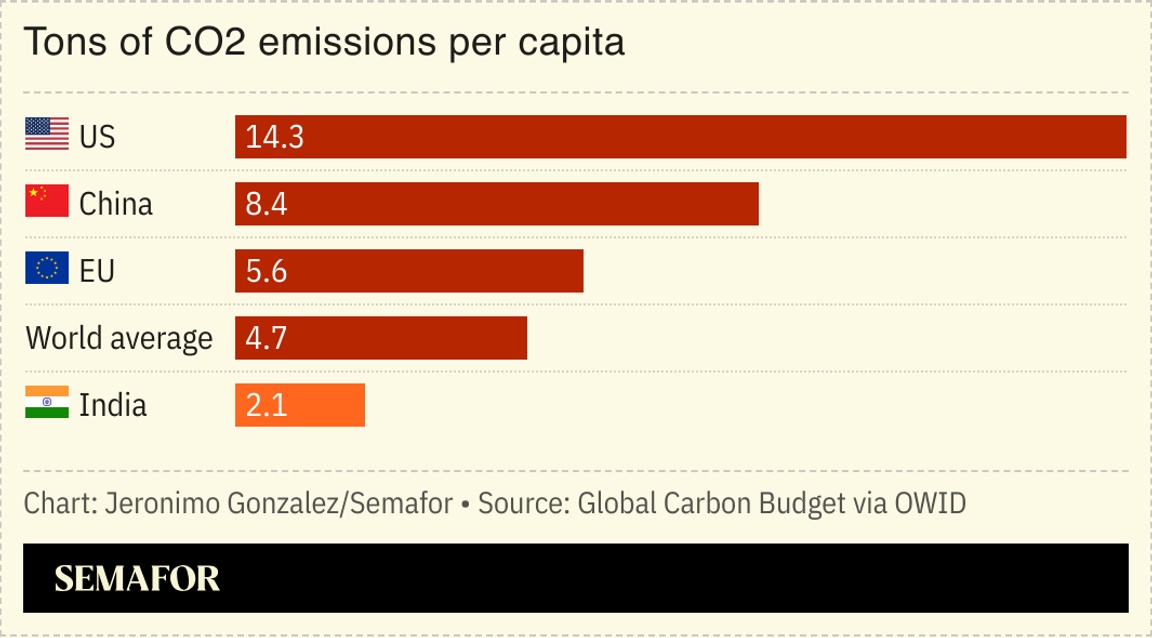 The Indian power sector’s emissions fell despite growing energy demand, driven by an expansion of renewables. India is responsible for just 8% of the world’s emissions, despite representing 18% of its population, but emissions have rapidly increased in recent years largely thanks to its coal-heavy electricity production. That growth has slowed sharply since 2024, driven by increases in clean energy: The country added 14.3 gigawatts of solar capacity in the first half of 2025, Carbon Brief noted, enough to power millions of homes, and emissions could peak before 2030. While the US may be turning away from renewables, other countries are not: Australia announced an ambitious target to reduce emissions to 38% of 2005 levels in the next decade. |
|
AI wins ‘coding Olympics’ |
 Toby Melville/Reuters Toby Melville/ReutersDeepMind and OpenAI outperformed the best humans at the International Collegiate Programming Contest, otherwise known as the “coding Olympics.” The world’s most prestigious programming competition has seen some great human competitors over the years, including Google’s Sergey Brin. Contestants have five hours to solve 12 programming problems, ones which test “abstract reasoning skills and creativity,” the Financial Times reported. The best human teams solved 10 problems; DeepMind’s Gemini successfully answered 11, while ChatGPT completed all 12. One Google VP described the breakthrough as “a historic moment towards AGI,” or artificial general intelligence, a machine capable of conducting all human intellectual tasks. The two AI models also achieved gold at the International Mathematical Olympiad this summer. |
|
|